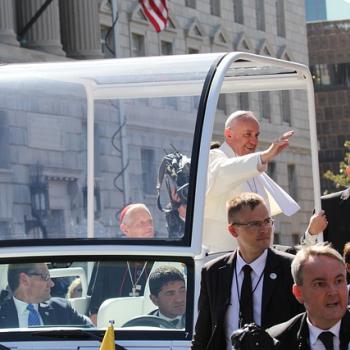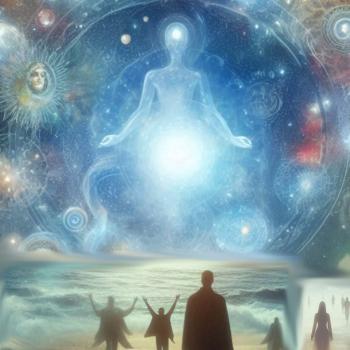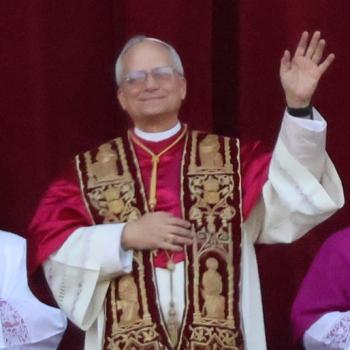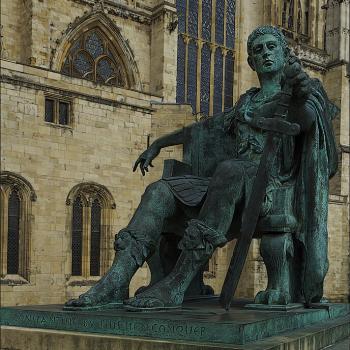Editors' Note: This article is part of a Public Square conversation on Civil Religion. Read other perspectives here.
I participate in an emerging national effort that aims to engage faith communities in pushing back against our country's mass incarceration regime—the punitive and racist system that legal scholar Michelle Alexander refers to as "The New Jim Crow." At a recent strategy conference I heard one speaker say, "Yes, there's no doubt that our country is exceptional: no other nation in history has incarcerated so many of its own people. Not even South Africa at its worst incarcerated such a high percentage of its Black people. I yearn for a time when the United States is just an average country."
In some ways the central goal of progressive Christians today is precisely this: to help our country and its people to move closer to the norm among developed countries in respect to honoring basic human rights and respecting human dignity. Along with dismantling The New Jim Crow, the "let's just be normal" agenda includes ensuring that all children get a leg up in life, that no one suffers hunger or homelessness, that worker productivity leads to better paychecks rather than merely gilding the stock portfolios of the corporate elite, that women's voices and women's moral discernment are fully respected, that we treat access to quality healthcare as a basic right, that we significantly close the corrosive wealth divide and take big money out of politics, and that we put a stop to our international bullying and our arrogant militarism.
A healthy and robust civil religion would embrace these goals as reflecting a widely-shared American agenda rather than a left-liberal one. But as the late Robert Bellah recognized when he wrote about the "broken covenant," what remains of our civil religion today is mostly the toxic strain that insists on American innocence in all cases, maligns and undermines supports for government itself, and even trashes the old covenantal concept of shared prosperity as "European-style socialism."
We who call ourselves progressive Christians cannot dodge the fact that as the center of public Christian discourse has moved far to the right over a forty-year period, our ideals and perspectives now stand out as marginal within the American Christian context. But we can take hope that our ideals are much less marginal when viewed within a rapidly-changing cultural context. They are more attuned to the aspirations and ideals of America's youth than are the strictures of conservative Christianity, and they even hold fairly strong appeal for the younger evangelicals who are forging their own path away from the scorched earth created by the culture wars of recent years.
Moreover, there is something to be said for being marginal if you believe that the dominant Christian discourse has lost its way. Historian David Hollinger, who has done more than any other scholar to document the remarkable achievements of 20th-century liberal Protestants—achievements that clearly pushed American civil religion in a healthy direction—wonders why today's progressive Christians haven't been more outspoken in challenging "obscurantist" versions of Christian faith that focus on "tiny segments of scripture" while missing the main thrust that speaks to freedom, equality, and justice for all people. Hollinger laments how this silence on the part of progressives has left the task of criticizing bad religion to secular thinkers, whereas those of us who could speak with authority to what the Bible really says have shied away from the task.
Candidly, I doubt that we gain very much at this point by flailing away at the shallowness and narrowness of the Christian Right. I doubt that many of our potential allies care to hear us ranting about what we're against. But they might rejoice to hear what we are for and to see how the social transformations we struggle to achieve embody and express the spirit of Jesus.
If, as we believe, the life and teaching of Jesus show us what God is like, then it's clear that God invites us even now to stand with the poor and dispossessed, to heal all of the sick and not just those who can afford to pay in a profit-driven health system, to curb the pretensions and the prerogatives of the wealthiest by restoring popular democracy, to put healing and reconciliation ahead of harsh punishment in providing for public safety, to replace our lonely and debt-laden consumerism with a cooperative and sustainable economic system, to renounce our warring madness internationally, and—hardest of all for some Christians—to accept that there are multiple paths to God.
False piety and narrow religiosity have had their day, but there is still time for us to go and find out what these words mean: "I desire mercy, not sacrifice." Progressives like me can best exemplify a generous Christianity—while helping to rebuild a healthy American civil religion—as we work in solidarity with others toward finally making these United States a somewhat normal country.
10/29/2013 4:00:00 AM




